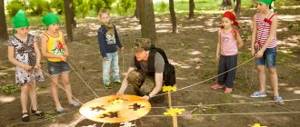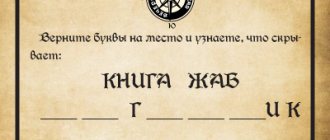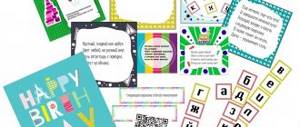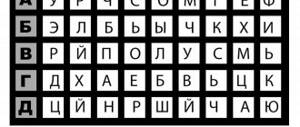Tourist quest game for schoolchildren
Quest game “In the footsteps of experienced tourists”
Explanatory note.
“It all starts in childhood...” is not just a catchphrase, but a formulation of one of the basic laws of social life.
Tourist activities of students are one of the effective means of complex influence on the formation of their personality. It integrates all the main aspects of education: ideological, moral, labor, aesthetic, physical, and significantly expands the horizons of schoolchildren. With the help of tourism and local history activities, there is a more effective impact of the natural and social environment on personal development. The specificity of tourism and local history lies precisely in the direct immersion of the student in the life around him. The quest game “In the footsteps of experienced tourists” was held at the Palace of Children's Creativity among secondary school students studying in creative associations of tourism and local history. Participants were asked to complete theoretical and practical creative tasks on tourism, topography, orienteering, ecology and local history. Quest (from the English quest - search) is a team game that involves not only endurance and erudition, but also intelligence, creativity and innovative thinking. The idea of the game is simple - teams move around points and complete various tasks. But the highlight is in the tasks! They are selected in such a way as to be as original as possible, interesting, suitable for the situation and not requiring special knowledge or skills from the players. Goal: promoting a healthy lifestyle, involving children in activities in creative sports and tourism associations. Objectives: • Development of tourism skills of young tourists; • Develop the creative abilities of students, broaden their horizons; • Formation of an emotionally positive attitude towards each other, a sense of teamwork. Participants: the quest game “In the footsteps of experienced tourists” is recommended for middle school students. Form of implementation: the game program consists of the following competitions: • “We are preparing for a hike”; • "Ecologists"; • “Safety Techniques”; • “Obstacle course”; • "Accurate shooter"; • “Special tasks clearing No. 1”; • “Top signs”; • “Nodes”; • “Special tasks clearing No. 2.” Conditions: team game. The team consists of 7-10 people. Each team must overcome 9 stages. Props: handouts for each team: competition “Glade of special tasks No. 1,2” - birds, animals, plants, mushrooms; “We are going on a hike” - signs with items necessary for the hike; "Topography" - topographical crossword puzzle; “Nodes”—pictures of nodes; for the “Obstacle Course” competition - hoops, “bumps”; for the competition “Safety Techniques” - blindfolds, skittles; for the “Ecologists” competition - “leaves” of trees with letters. Preparatory work. At the preparatory stage, all tasks were developed and it was thought out in which classrooms they would take place.
All necessary props for each competition have been prepared. In order for the game participants to better navigate the tasks, hint notes were hidden for them, which indicated at what stage which task should be completed in order to continue their journey further and find the “treasure”. To conduct a quest game, you need a team of assistants (tourist guides) who monitor the correct completion of tasks. For the tasks “Special Tasks Clearing No. 1”, “Special Tasks Clearing No. 2”, pictures were found and selected on the Internet. For the task “We are preparing for a hike,” we have selected the necessary things that a tourist must take with him on a hike. For the “Ecologists” task, tree leaves are printed and cut out of colored paper, on which letters are then written, from which words must be assembled. At some stages, for example, “Special Tasks Clearing No. 2,” you can place an assistant dressed in an animal costume. At the “Obstacle Course” stage - an assistant dressed as a judge. Expected results: • Children's interest in activities in creative associations of tourism and local history; • Improving the tourism skills of young tourists; • Development of skills and abilities to work in a team. This methodological development will be of interest to teachers and organizers of public events for novice tourists. Classes can be conducted either with an individual class or with a group of children of different ages. Quest game “In the footsteps of experienced tourists”
Game progress. I. Organizational part. Introduction. Host: Good afternoon, dear friends!
We are glad to welcome everyone to the Palace of Children's Creativity. Host: We all know that for a long time, for many centuries, people have been attracted by the road. What makes thousands of sailors and travelers, risking their lives, discover and explore new lands? (children’s answers) Host: I probably won’t be wrong if I say that many of you dream of walking the route “In the footsteps of experienced tourists” yourself and making not only some discoveries for yourself, but also finding a “treasure”. And what kind of treasure this is, we will find out about this at the end of our interesting game. Host: But on our way we may encounter sudden situations that will require decisive and skillful actions from you in the first minutes, or even seconds. Presenter: Today you all have the opportunity to demonstrate your knowledge, skills and abilities. II.
Main part. Task 1 “We are preparing for a hike” Presenter: When going on a hike, a real tourist packs his backpack. Now I invite you to become tourists who are going on a hike. Your task is to select the 15 most necessary items for a tourist on a hike from the items offered to you. Host: Are you ready? Then let's begin! Each team is given 30 items that partially duplicate each other. In 3 minutes you are asked to collect 15 items needed for the trip. Suggested items: tent, tarpaulin, sleeping bag, blanket, mug, glass, aluminum plate, knife, fork, scissors, awl, toothbrush, canister, axe, shovel, compass, lantern, candle, boat, first aid kit, emergency supply , flare gun, smoke bomb, repair kit, binoculars, camera, clothes brush, smart suit, spare sweater, rubber boots. Task 2 “Ecologists” Presenter: A tourist, I think, should know everything! And how to get around the swamp, and how to heal the trees. Now I offer you an unusual task. Look, leaves from various trees are hanging in front of you and letters are written on them. But these are not simple letters. You need to determine which words are encrypted among the scattered leaves. The box contains leaves from different trees. A letter is written on each piece of paper. Team members are asked to collect words from leaves. Words: tree, swamp, tourist, compass. Task 3 “Safety Techniques” Presenter: On your way you came across another task called “Safety Techniques”. The helmsman here will be the team captain, and your main task is to listen to him carefully, otherwise trouble will not be avoided. Listen carefully to the task. Team members line up in one line one after another. The team captain stands at the end of the column. All participants are blindfolded; only the captain can watch and control the entire team. Children need to complete the route without knocking down a single pin. There will be a note on the final pillar telling you where the next stage is. Task 4 “Obstacle Course” Presenter: Each tourist has to overcome various obstacles: go through a swamp, make his way through thickets of bushes, go down steep ravines. Now you will have to complete a tourist obstacle course: go through a swamp without falling into the water (go over hummocks), make your way through thickets of bushes (get through hoops). There should be 1 person per stage. Task 5 “Sharp Shooter” Presenter: You deftly cope with all tasks. Well done! We can say about you that you are real tourists. But our tasks do not end there. Now you must work as one united, cohesive team and listen to each other. Team game for team building. Participants need to listen carefully to each other. To play, you will need a jar with ropes tied to it around the entire circle and a jar with a larger diameter (2-4 cm). Each participant takes the end of the rope, while lifting the can, and walks towards the intended goal (a can with a larger diameter). Each participant’s rope must be taut and not sag. The task of the participants is to approach the goal as quickly as possible and hit the can with the can. Task 6 “Special Task Clearing 1” Presenter: It’s time to show what kind of foresters you are. Can you distinguish edible mushrooms and berries from inedible ones? You need to identify 6 plants, 6 mushrooms. Task 7 “Topographic signs” Presenter: In the crossword puzzle, among the letter chaos, you need to find the name of the topographic signs. Words can change their direction in any direction. Task 8 “Knots” Presenter: Every tourist should be able to tie knots. Yes, not only “simple” and “counter”, and “rabbit ears”. Team members are asked to guess from the picture which tourist knots are presented: “straight”, “rabbit ears”, “bowline”, “eight”, “counter”. Task 9 “Special Tasks Glade 2” Presenter: In this “Special Tasks Glade” I invite you to become ornithologists and zoologists. Host: Do you know who ornithologists and zoologists are? Think and say what task you will need to complete. It is necessary to identify 6 animals, 6 birds. III. Final part. Summarizing. Host: Now I can say about you that you are real tourists. The swamp was passed, the bushes got through, the trees were saved. You can safely go on a trip. The main thing is not to forget your map and compass, because you already know the topographical signs and can tell a sparrow from a nightingale! Host: And most importantly, you showed all your knowledge, skills and abilities, which will definitely be useful to you on the hike, because this is our “treasure”. I am sure that each of you is “rich” not only in your knowledge, skills and abilities, but also in an excellent mood and positive emotions! Host: Did you enjoy your visit with us? Will you come to us again? Host: Thank you for coming to the game. See you again! References 1. A.L. Novikov. Educational and cognitive games with topography elements (textbook). – M.: TsDYuTiK, 2004, P.68 2. E.L. Rodionov. Problems of school education. Game-competition “Unknown paths”. – Nizhny Novgorod Humanitarian Center, 2003, pp. 103-107 3. Samokhin Y.S., Samokhina T.A. Tourism in a children's health camp. –M.: Pedagogical Society of Russia, 2003
We recommend watching:
Useful tips and recommendations for parents on organizing summer holidays with children. Sports event for a summer playground. Scenario for grades 2-4 Tourist game for younger schoolchildren Tourist game by stations for schoolchildren
Similar articles:
Spartakiad for schoolchildren
Travel game for summer camp “Secrets of Happiness”
Will I be scared?
Yes, but only if you want to be scared. If you prefer scary games, then choose quests with actors using this link and go meet chilling stories. If you prefer unbridled fun to fear, these quests will take you into a crazy world of jokes and adventures.
And for parents who want their children to avoid mystical and frightening stories, there is a special section with quests for children and teenagers - we have collected only the cutest and most interesting stories there.
Profitable business
The first quests in Russia appeared in 2013 and immediately became popular. Currently, about 5 thousand quests and 150 performances are held in the country. The organizers are ready to offer you a plot and tasks for every taste and budget. There are several varieties of such games: the so-called reality quest and performance. The difference between a performance and a classic quest is that in the first, actors play an interactive thematic performance for visitors, and in the other, clients go through the game themselves.
Companies organizing quests appear like mushrooms after rain. You can understand them: the activities of quests are not licensed in any way and are actually not controlled by anyone. You just need to register a legal entity, and then find a suitable premises or site, come up with an exciting script, hire actors and advertise everywhere. However, there are no legal restrictions on the use of props. Knives, axes and even stun guns - some companies are ready to use any means to tickle the nerves of players. Like any small business, quests are prohibited from being checked outside of scheduled audits. Inspectors from Rospotrebnadzor or the Ministry of Emergency Situations may come unscheduled only if clients complain about the quest.
According to the founder of one of the largest in this market, launching a high-quality quest or performance costs at least several million rubles. Thus, organizing a performance about a bank robbery, where participants are invited to get into the role of criminals, cost the company almost 30 million rubles. And this does not take into account the rental of premises, the script and the services of actors. At the same time, the cost of tickets for the game reaches 12 thousand rubles. The SPARK database says that in 2015, “Claustrophobia” earned 23 million rubles. Naturally, profit also attracts unscrupulous players to the market, who are ready to save on everything, including customer safety.
Victims of "Bloody Santa"
“Forget about gifts and the Christmas tree. Forget about songs and round dances. The jokes are over! If you find yourself in Bloody Santa's lair, know that it is almost impossible to get out. Santa is already looking at you from the darkness and sharpening his ax. You will have exactly one hour to save your soul. To get out, you have to force your brain to work in the most stressful situations,” this is the description of the quest-performance “Bloody Santa” on the website.
There was no end to those wanting to play “Bloody Santa.” Tickets for the game for 5-6 thousand rubles were sold out with a bang. The excitement of potential clients was also fueled by laudatory reviews from famous actors and musicians. For example, on the company’s website, the quest is recommended by the actor of the series “Fizruk” Arthur Sopelnik, musician Dmitry Bikbaev and the star of the series “Give Youth!” Angelica Kashirina.
On Sunday, 22-year-old metropolitan student Alexander went with friends to tickle his nerves in a sensational quest that recently opened in the industrial zone of an automobile repair plant on Aviamotornaya Street. The game for Alexander ended in the hospital: the actor playing the role of Santa Maniac became so enraged that during the quest he hit the guy with a real axe. Thank God, the blow was tangential - doctors diagnosed the student with a wound on his head and a cut in his ear. Now Alexander goes to get bandages, and the capital police are finding out how the “Bloody Santa” quest worked, why the actor ended up with a dangerous ax in his hands, and how the safety of clients was generally ensured.
As it turned out, even before the Sunday incident, customers complained that the playing conditions were too harsh and asked the organizers to strengthen security measures.
— “Quest Show” request to have a first aid kit! Guys, this is a banal safety technique. We all crawled out beaten: each had at least one bruise, my fingers were crushed by the lid of the coffin, and, apart from a bowl of not very cold tap water, they couldn’t offer me anything as first aid,” he complained after passing “ Bloody Santa" by a VKontakte user named Alexander.
Muscovite Anna also went to see “Bloody Santa” and in a conversation with Life confirmed that the actor really swung the ax in all directions, and it was only by miracle that no one was hurt.
— There are several actors there. We came across a rather tough “Santa” who hit me hard with his head, which was unexpected and unpleasant. As for the ax, he really swung it in all directions, including close to his fingers; it was scary that he might miss and get hit, especially in the dark,” the girl recalls.









